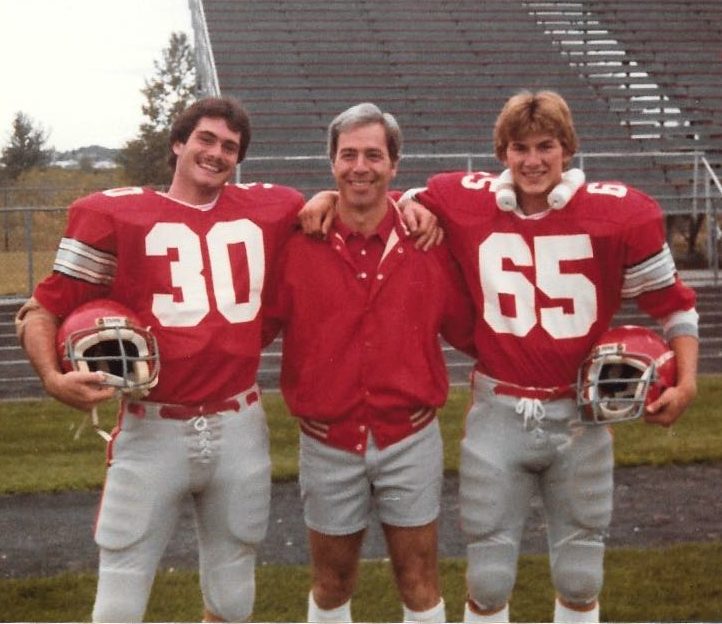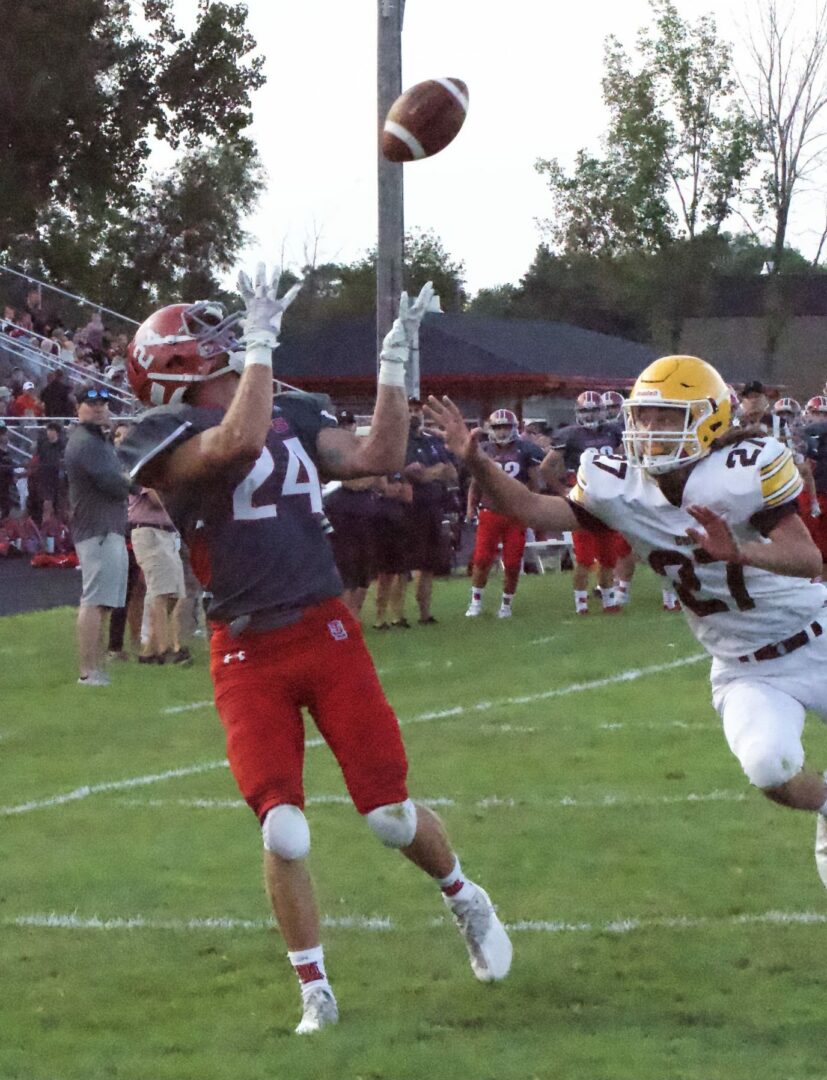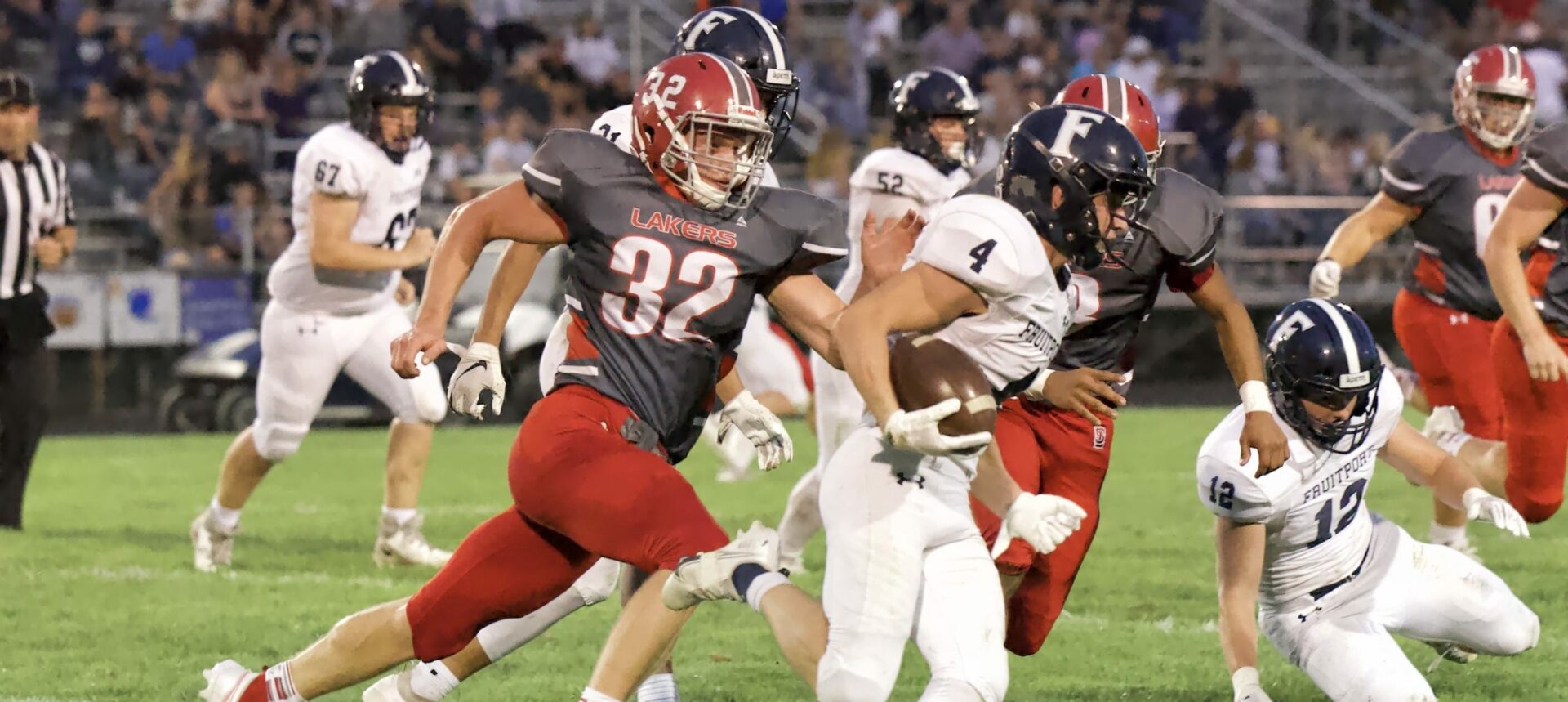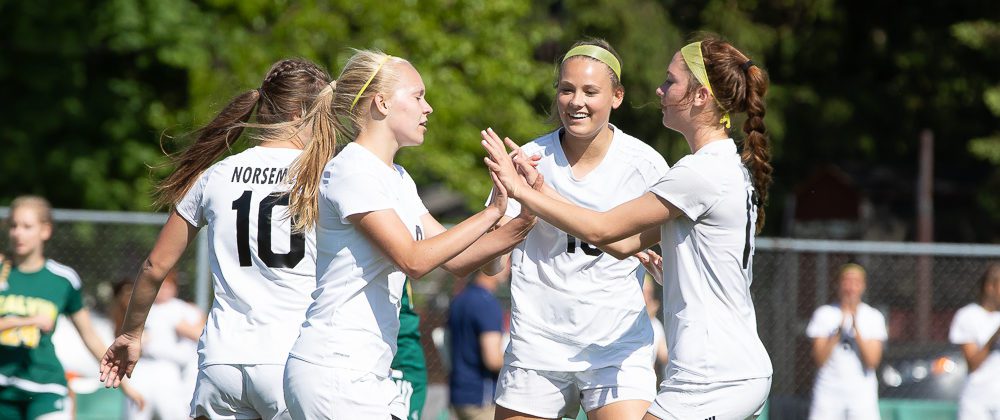By Tom Kendra
LocalSportsJournal.comSpring Lake football is having a ton of fun this fall, racking up wins behind a raucous student section and dreaming about a long playoff run.
Mike Secory is enjoying the Lakers’ magical fall as much as anybody, but he can’t help but think back to another great Spring Lake team 40 years ago and wonder:
What might have been?
Secory was one of the varsity coaches on the great Spring Lake teams of 1980 and 1982, both of which went a perfect 9-0 in the regular season and failed to make the playoffs, victims of the old Michigan High School Athletic Association system where just eight teams in four classes – 32 teams total from the entire state – qualified for the postseason.

1982 Spring Lake assistant football coach Mike Secory stands with Bryan Turner (30) and Mark Hatfield during the 1982 season when the Lakers went 9-0 but did not qualify for the playoffs. Photo courtesy of Mike Secory
“It was devastating, really, to have our seasons just end without ever losing a game,” said Secory, a longtime Spring Lake elementary teacher and coach. “It’s hard not to think how we would have done. What made it so disappointing as a coach was that there were some outstanding kids on that team and they were never given a chance.”
The 1980 Spring Lake team finished 9-0 and outscored its opponents 228-47, but just missed qualifying for the Class B playoffs due to the point system, which awarded more points for wins over bigger schools. Adding salt to the wound was watching neighboring rival Muskegon Catholic make it in with an 8-1 record and then go on to win the Class B state championship.
The 1982 team was an even bigger snub as the Lakers were again 9-0, but this time posted eight shutouts and outscored its opposition by a whopping 266-6. Once again, Muskegon Catholic got in ahead of the Lakers on points and rolled to its second Class B playoffs state championship.
“They were obviously a great team, I mean they only gave up 6 points all year,” said Joe Westhoff, a standout senior receiver for this year’s Lakers, whose father, Joel, was an honorable mention all-state receiver on the 1982 team. “Me and my dad really don’t talk about it that much, but I know if we make it this year, we are going to make the most out of it.”
Playoff evolution
Those hard-luck Spring Lake teams of the early 1980s were part of the argument to expand the MHSAA playoffs, which have evolved and grown steadily since their inception in 1975.
Prior to 1975, high school football teams in Michigan had to satisfy themselves with the word “mythical” in front of their state championships. With no playoffs, state championships were simply taken from the final state rankings from The Associated Press or the United Press International.
In 1975, the Michigan High School Athletic Association took its first step in crowning a football state champion on the field, not in the paper, eliminating the word mythical from future state champions. The 1975 playoffs featured just 16 teams, four in each class, and included just two weeks of playoffs for semifinals and finals. In 1977, the playoffs doubled, with eight teams in each class, adding a quarterfinal game (this was the format when Spring Lake was snubbed in 1980 and 1982).
The playoffs expanded, then expanded some more, then expanded even more to the point that since 1999, the playoffs have included 256 teams annually.
Last year, due to the many cancellations and disruptions from the Covid pandemic, all teams made the playoffs for the first time.
This year, the MHSAA has gone back to 32 teams from each of the eight divisions qualifying for the postseason. The big changes are that schools now know before the season which division they will be in and they are no longer guaranteed a berth with six wins – it is now based totally on points, not a set number of victories.
The Fall of 1982
Secory chuckles at some of the changes in high school football since that last undefeated Spring Lake football team in 1982.

Spring Lake senior Joel Weshoff hauls in a 25-yard touchdown pass from Jackson Core during the Lakers’ 56-21 win over visiting Zeeland East on Sept. 2. Photo/Kelly Gates
“Well, for one thing, we only had three coaches – where now it seems like teams have about 20,” Secory, 79, said with a grin. “And it was a much simpler game on the field. Our quarterback (Brad Anderson) was under center every play and we ran the ball about 95 percent of the time.”
Tom Grabinski (a.k.a. “Grabber”) was the head coach of both of the undefeated teams, assisted by Tom Holden and Secory. The Lakers’ field is now named in honor of Grabinski, who died of cancer in 1986 at the age of 39.
Spring Lake, perhaps motivated by a less-than-stellar performance in their preseason scrimmage, started off the 1982 season with three straight shutouts – including an always-satisfying 7-0 victory over bigger rival Grand Haven in a driving rainstorm.
It was Week 4 against Whitehall when the Lakers allowed what turned out to be the only points of the season, a late touchdown against the SL reserves in a 31-6 win.
Bryan Bench was a speedy, touchdown-scoring machine from his halfback spot, while the “other Bryan” – fullback Bryan Turner – was a battering ram lead blocker and unstoppable force in short-yardage situations. Anderson-to-Westhoff was the main aerial weapon, while the leaders up front on both sides of the ball were Dennis Converse, Ron Willard, Doug Clark and Eric Anderson.
The Lakers really got things rolling over the second half of the season, outscoring its final five opponents by an average score of 38-0.
While the Lakers were rolling, local media was starting to anticipate and hype up a Spring Lake vs. MCC first-round playoff matchup. Unfortunately, after downing a very good Grand Rapids Forest Hills Central team in Week 9, the Lakers learned out shortly afterwards that they were edged out by East Grand Rapids for a playoff berth.
“It was so upsetting and frustrating, but we gave our kids a parade through town and celebrated a perfect season,” Secory recalled. “We even drove through Grand Haven yelling and screaming, so that was fun.”
Another Lakers’ run?
Perhaps it’s the curse of the 1980 and 1982 teams, but since the perfect campaign 39 years ago, Spring Lake has had little playoff success – despite fielding some very good teams.
The Lakers have qualified for the playoffs 15 times, but 12 of those appearances were one and done and twice they won just one game before bowing out (in 2001 and 2020).
Spring Lake’s one magical playoff season came in 2000, when standout running back Art Anderson and quarterback Carey Pohlman led the Lakers to four playoff victories, before losing to Jackson Lumen Christi in the Division 5 state finals at the Pontiac Silverdome.
This fall, the Lakers have a veteran team which might be the best since Coach Jerry Rabideau’s state finalist team of 2000.
Christian Folkert is is the team’s leader from his running back position, while Alex Lee and Ty French are among the other top runners. Jackson Core is a steady senior quarterback, whose favorite targets are Westhoff and Derrick Paggeot. Senior twins Hunter and Travis Throop lead a stout offensive line.
“Spring Lake’s team this year is a lot like that 1982 team – they are very comparable,” said Secory.
One thing is for certain, the Lakers will not be shut out of the playoffs if they go unbeaten. In fact, competing in the rugged OK Blue Conference, five wins might well be enough to get them into the Division 4 playoffs.
The Lakers got one boost before the season even started. When the playoff divisions came out earlier this year, it was revealed that with 825 students in the high school, Spring Lake is the largest Division 4 football school in the state. One more student and SL would have been the smallest school in Division 3.
“I’m not mad about that,” sixth-year Spring Lake coach Dan Start said with a smile. “We have a good team and a great opportunity this year. We play in a very, very difficult conference and that will make us better. It’s up to us to work hard and keep getting 1 percent better each day. If we do that, we should do just fine.”
















